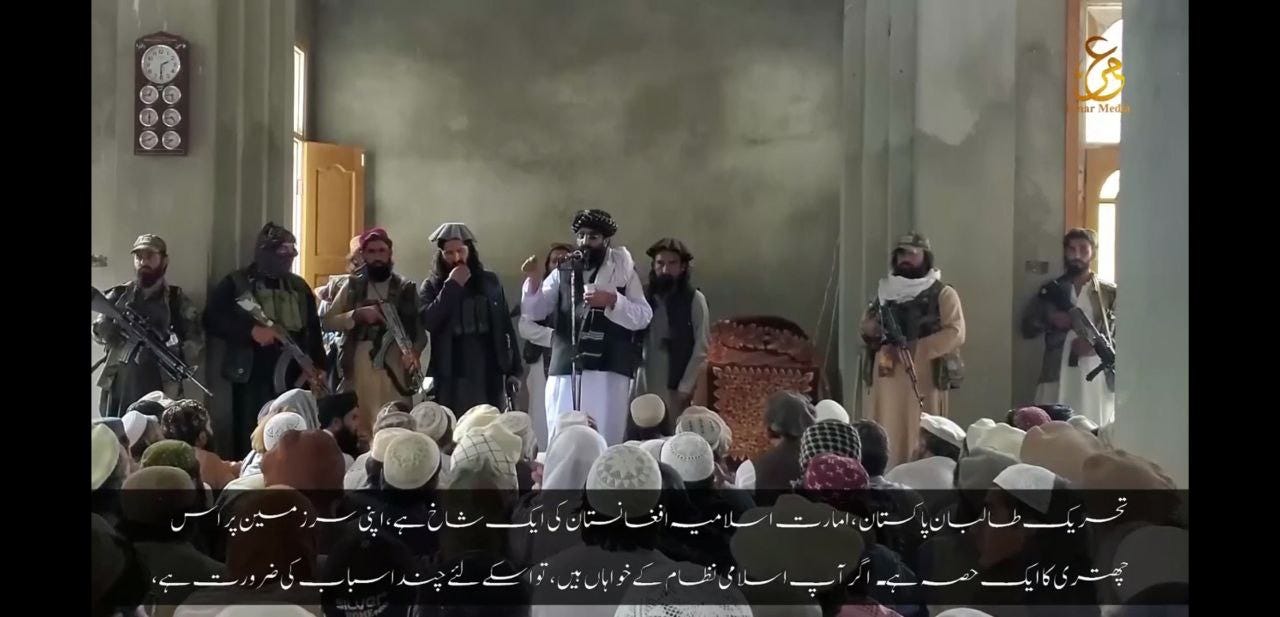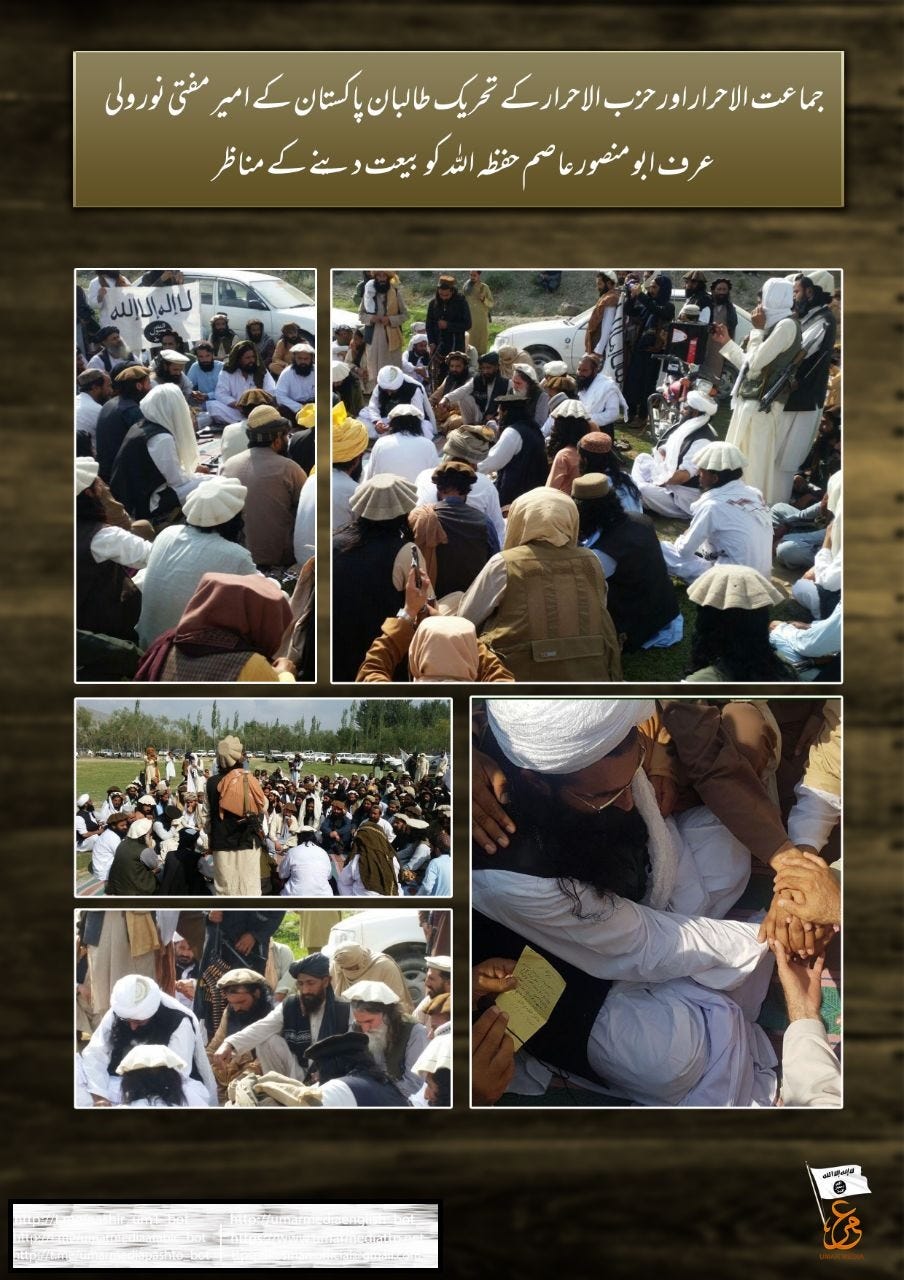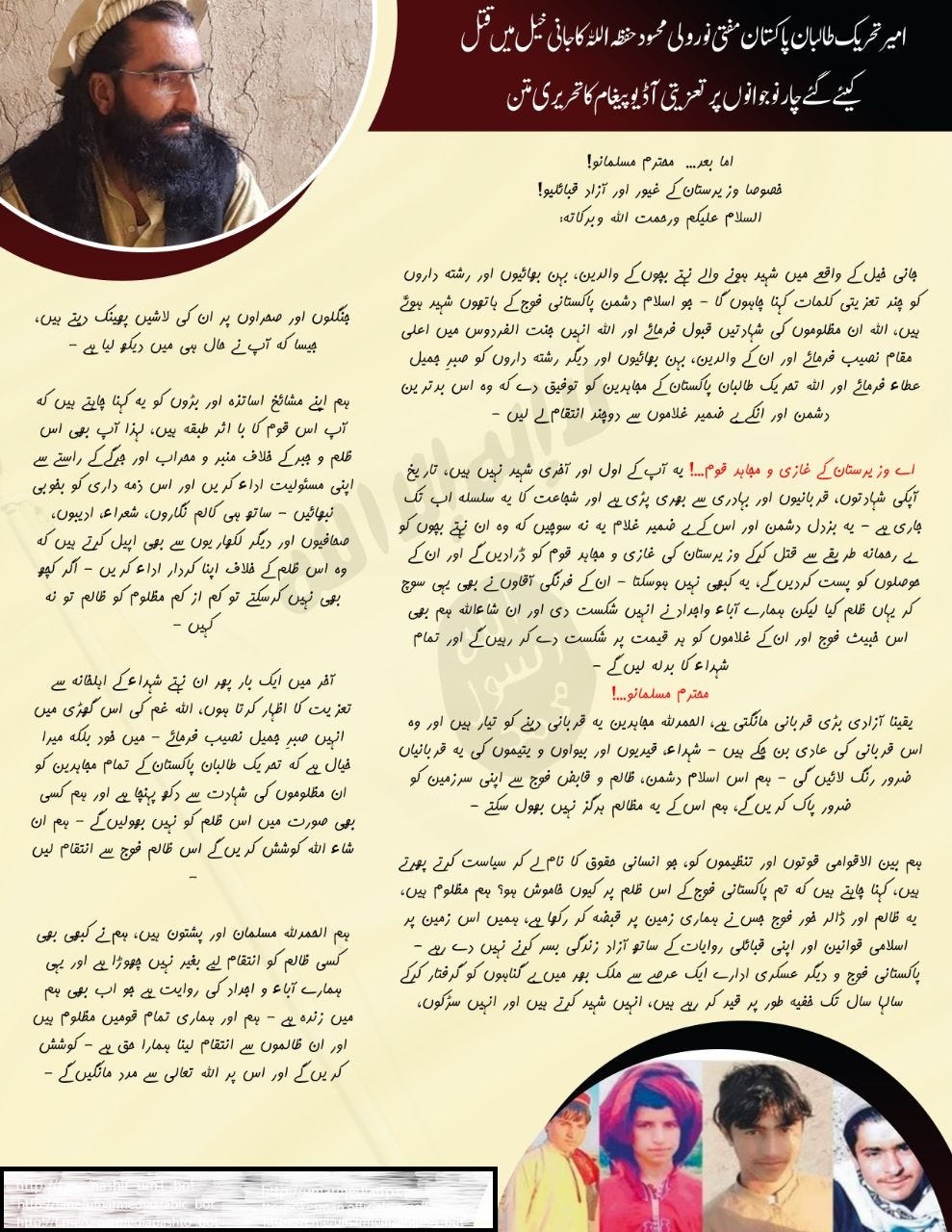Tehreek-e-Taliban Pakistan (Movement of Students in Pakistan), or TTP, is a Sunni Islamist and pro-Pashtun movement and was formed by al-Qāʿidah-allied tribal militants under the leadership of Baitullah Mehsud in 2007. It is an alliance of militant networks that was formed as a front to oppose the Pakistani military. The Pakistani tribal militants were opposed to the Pakistani state's participation in the U.S.-led war on terror after 9/11.
After the U.S. invasion of Afghanistan in 2001 and the toppling of the Taliban government in Kabul, the Pakistani militants hosted Taliban and al-Qāʿidah (AQ) foreign militants on the Pakistani side of the border. Pakistan decided to take action against these militants after receiving pressure from the U.S. government. The Pakistani tribal militants were incensed at this action of the Pakistani state. The July 2007 military operation against Lal Masjid in Islamabad acted as a catalyst. The incident impelled many Pashtun tribal militants to come together and unify their efforts. As a result, TTP was established in December 2007. As Noor Wali Meshud narrates in his book Inqilab-e-Mehsud, the TTP was formed as an umbrella movement in an effort to unite all different factions of the Pakistani Taliban; Baitullah Mehsud was chosen as Emir, while Maulvi Faqir Mohammad was appointed as his deputy and Maulvi Omar the official spokesman; the sole objective of the was to fight against NATO forces in Afghanistan and to wage a “defensive jihad” against Pakistani forces.
Many non-Pashtun militants from various areas of Pakistan, who were angered over the Red Mosque operation, decided to join TTP and attended training camps in Waziristan. These militants came to be known as “Punjabi Taliban”. The Pakistani government officially recognized and banned the TTP on August 25, 2008. Subsequently, all accounts and assets associated with the TTP were frozen.
Immediately, after its formation, TTP became the most dangerous militant group operating inside Pakistan. The group took control of swaths of Pakistan's tribal areas. At one point, the entity directly threatened the U.S. Homeland. According to the U.S. government, TTP “directed and facilitated Faisal Shahzad’s failed attempt to detonate an explosive device in New York City’s Times Square on May 1, 2010.”

In late December 2008 and early January 2009, then-al-Qāʿidah leader Osama bin Laden and Afghan Taliban leader Mullah Omar met with the three dominant TTP commanders — Baitullah Mehsud, Hafiz Gul Bahadur, and Maulvi Nazir. The commanders were encouraged to put their differences aside and reduce their operations in Pakistan in order to help the Afghan Taliban counter the U.S.-led coalition forces in Afghanistan. The three commanders agreed and formed a temporary alliance, known as the Shura Ittihad al-Mujahedeen (Allied Mujahedeen Council) in February 2008. However, the council disbanded in August 2009, due to fighting between the three leaders. Bahadur and Nazir subsequently split from the TTP and resumed operations as independent Pakistani Taliban groups not affiliated with the TTP leadership.
The group was seen as a potent threat until 2014 when attrition from U.S. drone strikes and a military operation (Zarb-e-Azb) launched by Pakistani security forces decimated the group's presence in Pakistan. The militants were forced to retreat in areas of eastern Afghanistan bordering Pakistan.
Hakimullah Mehsud was killed in a U.S. drone strike in November 2013 amidst reports that he was ready to take part in peace talks with the Pakistani government. Reports also started emerging that setbacks for the group were aggravated by internal fracturing and disagreements. This worsened after Hakimullah's death. Infighting began and, with the emergence of the Islamic State, defections followed.
Maulana Fazlullah was appointed as the new leader of TTP by a shura. Following his appointment, a bitter succession dispute began between TTP member groups. This was because Fazlullah was not a member of the Mehsud tribe (The Mehsud faction is one of the largest and most powerful factions of TTP). Fragmentation started due to disagreements over key decisions and the group's operational capabilities began to change.
The targeting of civilians was also a point of contention and a major factor that led to the decline of TTP. The targeting of school children in the Army Public School (APS) in Peshawar in December 2014 led to a great backlash. Hundreds of militants were killed in counter-terrorism operations across the country. TTP was publicly condemned by various other jihadi groups like the Afghan Taliban, al-Qāʿidah, Jama’at ul-Ahrar (JuA), and the TTP Sajna faction.
In February 2017, the Pakistan Army launched “Operation Radd-ul-Fasaad” to eliminate whatever threat of TTP remained.
Mufti Noor Wali Mehsud was appointed as the leader of TTP, one week after Fazlullah was killed in a drone strike in Afghanistan in June 2018. Since then, he has worked to revamp and rebuild the group. He focused on improving internal discipline, increasing cohesion, and reducing indiscriminate violence. Various factions that separated from TTP were re-integrated into the group starting from 2020.
Mergers
The series of mergers into TTP began in early July 2020 when Hakeemullah Mehsud group (under the leadership of Mukhlis Yaar), a TTP splinter group, decided to join TTP. Later, in August, Usman Saifullah Kurd faction of Lashkar-e-Jhangvi, headed by Maulvi Khush Muhammad Sindhi, came back into TTP. Two more extremely powerful TTP splinters — Jamaat-ul-Ahrar and Hizb-ul-Ahrar merged back into TTP.
Splinter organizations apart, two major Pakistani al-Qāʿidah groups also announced their merger into TTP at the end of July 2020. Commander Muneeb and Amjad Farooqi groups were the ones who joined TTP.
Aleem Khan's group (Aleem Khan was deputy to Hafiz Gul Bahadur), was the first militant group of Waziri tribes to join TTP, thus giving a notion that TTP had started to recover from internal turmoil and was getting stronger. The same month, another TTP pamphlet suggested that Umar Izzam, known as Ghazi Umar Izzam, from Miami tribe joined the TTP along with his group “Musa Shaheed Karwan.”
• October 06, 2021 — Maulana Sher Alam, Commander Asad and Dr. Hameed of Shehriyar Mehsud's group pledged allegiance to Mufti Noor Wali Mehsud.
• August 07, 2021 — Ustad Aslam's group pledged allegiance to Mufti Noor Wali Mehsud.
• January 09, 2022 — A group of militants from Bannu, led by Commander Zarar, pledged allegiance to Mufti Noor Wali Mehsud.
• March 07, 2022 — Hafiz Ehsanullah, along with all his comrades, pledged allegiance to TTP. He is the grandson of Haji Mirzali Khan Wazir (aka Faqir of Ipi), a jihadi and revolutionary figure, who fought against British imperialism.
• March 10, 2022 — Three jihadi factions from Lakki Marwat, led by Commander Maulvi Tipu Gul, pledged allegiance to Mufti Noor Wali Mehsud.
• May 06, 2022 — A group of militants, under the leadership of Eid Marjan, from Spinwam tehsil of North Waziristan district pledged allegiance to Mufti Noor Wali Meshud.
• May 07, 2022 — Militants belonging to Naib Abdul Rehman alias Ezzatullah Kheyali group, under the leadership of Ahmad Dawar, from Datta Khel, North Waziristan district, pledged allegiance to Mufti Noor Wali Mehsud.
TTP’s Recent Propaganda Strategy
The new approach of the TTP Emir Noor Wali Mehsud is also reflected in the group’s propaganda output released after his appointment as leader of the movement. Particularly, there has been a gradual shift towards a Pashtun-centric narrative, often with reference to socio-political-economic issues, and particularly highlighting the relevance of the tribal system.
Even before being elevated to the TTP leadership, in his 2017 book Inqilab-e-Mehsud, Noor Wali Mehsud dedicated several pages to the history of the Mehsud tribe and, in general, to the role of Pashtun tribes in the struggle for jihad in Afghanistan and Pakistan. Specifically, the first chapters of the book address at length the differences between the democratic system and the tribal system, arguing that the latter is better framed to satisfy man’s religious, spiritual, and moral needs in human society. Moreover, it specifically says that TTP’s jihad is a three-front war — in Afghanistan, in the tribal areas, and in Pakistan — with different objectives. Regarding tribal areas, Noor Wali argues that there is a long-term strategy by Pakistan and the US to dismantle the tribal system which includes the integration of FATA into Khyber Pakhtunkhwa — a decision the TTP asked to reverse during recent peace talks with Islamabad. Noor Wali states that while the tribal people were fighting under the banner of the Emirate in Afghanistan against the US, Pakistan “invaded” their sanctuaries; thus, the TTP is fighting a defensive jihad against Pakistani invaders and a “war of liberation” from Pakistan.
Particularly since 2020, Noor Wali Mehsud’s TTP started to employ a new narrative. In July 2020, following a UN report which stated that the group had links with the Islamic State Khurasan Province (ISKP), TTP spokesman Muhammad Khurasani issued a lengthy statement distancing the group from ISKP and accusing Pakistan of creating Daesh in the region. The statement also argues that after Partition, Pashtun tribes decided to side with Pakistan only because of an agreement which gave freedom to the tribes along the Durand Line; an agreement which was not respected by Pakistan which “invaded” tribal areas during the Soviet invasion of Afghanistan, depriving the tribes of their own government and replacing Sharia with “British” law. This statement is exactly what Noor Wali Mehsud had been writing in the first chapters of the history of the tribes.
Again, in February 2021, TTP issued a new statement rejecting another UN report which was giving credit to AQ for the recent unification process in the TTP. The message firmly stated that TTP’s struggle is solely carried out by the TTP and is limited to Pakistan, not posing a threat to other neighbouring countries. These points had been reiterated in a similar statement which also rejected a third UN report which linked AQ, TIP, and TTP together, in February 2022, addressing the US and arguing the group is only focused on Pakistan. This attempt by the TTP to reassure other countries of its limited fight against Pakistan has involved also a soft approach towards China, as in the aftermath of the Dasu attack in August 2021, when the TTP denied any involvement in the incident and stated the group had nothing against China. A similar dynamic was also displayed by the group when it claimed the attack at the Serena Hotel in Quetta, in April 2021, stating the group was targeting solely Pakistani security forces in the hotel, and dismissing the idea that the group wanted to target the Chinese ambassador, who had left the hotel shortly before the attack. However, it should be noted that the initial statement released by the TTP mentioned both security forces and foreigners as targets of the operation.
In March 2021, Noor Wali Mehsud issued a statement on the occasion of the tragic killing of four Pashtun boys in Jani Khel area, again describing the suffering of the Pashtun people and calling for the independence of the tribal areas. Going further, in June 2021, TTP also issued a statement referring to a USIP report on the Pakistani Taliban published in May 2021, this time addressing the United Nations and asking to recognize the TTP struggle as a war of independence, mentioning the Baloch people as those who suffer. During the same month, on the occasion of Eid-ul-Fitr, Noor Wali Mehsud took the opportunity to once again address the cause of Pashtun tribes, calling on international organisations to condemn Pakistan. And in July 2021, Noor Wali Mehsud held an interview with CNN during which he essentially reiterated his commitment to liberating the tribal areas from Pakistan.
The TTP has also progressively developed a soft spot for Baloch people, at least rhetorically. In the February 2021 statement, the group argued that both Pashtun and Baloch people had been suffering for years “Pakistan’s oppression”, deprived of their rights and of “gas, water, and electricity”. Some months later, in May 2021, in an interview with Radio Zrumbesh Urdu, Muhammad Khurasani stated that the TTP was against the Pakistani army’s actions in Balochistan, though avoiding answering the question if he was supportive of Balochistan’s independence. On the occasion of Eid-ul-Fitr in 2022, TTP issued a statement which also mentioned the Baloch tribes, similarly to another message published in May 2022 which repeated that Pashtun and Baloch people were deceived by Pakistan as they joined the state only because of an agreement based on Sharia which was never respected by Islamabad.
This attention by the TTP to the Baloch community is also proved by the fact that the group recently published two tarana in the Balochi language dedicated to the plight of Baloch people, calling on them to join the jihad.
Conclusion
Under Noor Wali Mehsud, the TTP has demonstrated its capabilities to recover from a post-crisis period in 2018 and become once again Pakistan’s main security challenge. The collapse of the recent peace talks was followed by an increase of attacks by the group against Pakistani forces, culminating in its first spring offensive in Pakistan — called al-Badar — announced on the first day of Ramzan, following the model of the Afghan Taliban. Similarly, the group reorganised its administrative structure following the example of the Afghan Taliban. With the support of the Afghan Taliban, who are not willing to cut ties with their brethren, any attempt by Islamabad to reach a settlement agreement with the TTP seems rather unlikely if TTP’s demands are not entirely met. Afghan Taliban support was also reiterated recently after Pakistani aircraft violated Afghan air space and targeted alleged TTP members in Khost and Kunar, killing several civilians, in response to TTP’s cross-border attacks. Since the Taliban’s return to power, the TTP has increased its attacks in Pakistan. The group has claimed 267 attacks between September 2021 and April 2022, except for the month of November when the ceasefire took place, hence only three operations were claimed. The distribution of attacks saw 37 attacks claimed in September; 24 in October; 45 in December; 42 in January; 22 in February; 40 in March; and 54 in April, according to data collected by the authors.
On the other hand, a worrying development for the region and the TTP is the case of overlapping claims from TTP and ISKP/Islamic State Pakistan Province (ISPP) for the same operations conducted in certain areas. Five of these instances have been registered between December 2021 and April 2022; two in Rawalpindi, one in Nowshera, one in Khyber, and one in Peshawar. The fact that ISKP/ISPP has been claiming the same attacks as the TTP and vice-versa may have different implications, from a competition between the two groups for media presence to some limited defections from TTP into ISKP/ISPP.








Another great Militant Wire post - keep them coming!